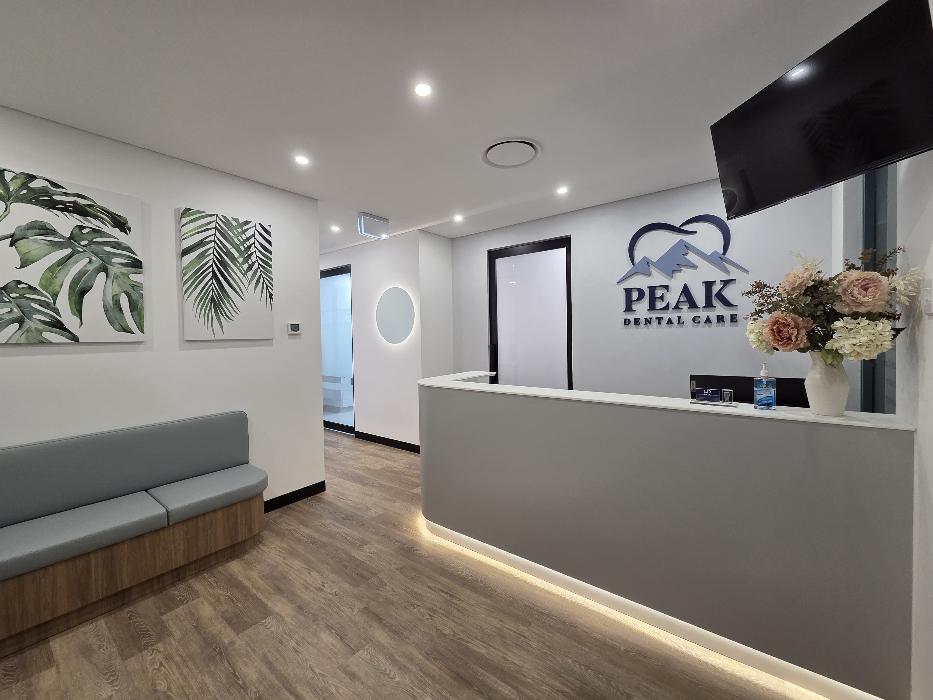How can we help you?
At Peak Dental Care, one of our guiding principles is collaborating with you to provide the dental care you need most. Towards that end, we always discuss your treatment concerns and never hesitate to answer questions about our clinic, treatments and procedures.
We've compiled common questions with their answers in this area to help achieve this end. We've organized them by service to make the answers easier to discover. If you have a question you don't see here, we encourage you to contact our Blacktown clinic so we can include your question and the appropriate answer.
Root Canal Therapy
Root canal therapy in Blacktown is a way to save a deeply infected tooth from loss and eliminate oral pain and swelling.
If you need root canal therapy, you have an infection deep in your tooth’s root. This infection can cause excruciating pain if left untreated. You may also notice a blister on the gum with swelling.
In some cases, if the infection is significant and the tooth is beyond repair, your dentist may recommend extraction, an alternative to root canal therapy. However, replacing the extracted tooth is vital to keeping your smile healthy and your teeth in line. Extraction can lead to tooth shifting and future tooth loss.
We believe the best replacement option is a dental implant in Blacktown due to its longevity and stability.
About Root Canal Therapy
Many patients report that root canal therapy is not painful. We numb the treatment site and use modern methods to clear the infection from your tooth. We later enclose the tooth with a dental crown, a tooth-shaped cap, customised to match your unrestored teeth.
A tooth root infection is a dental emergency that needs professional treatment immediately.
For Root Canal Therapy, We Welcome Your Call
If you've just had a root canal in Blacktown, you might be wondering when and how you can get back to enjoying your favourite foods, especially if there’s a piping hot laksa or steak dinner calling your name. Fortunately, you can eat normally after a root canal, but there are a few things to keep in mind to ensure a smooth recovery.
Immediately After the Procedure
Immediately after the procedure, your mouth may still be numb from the anaesthetic. During this time, it’s best to avoid eating at all until the numbness wears off. This helps prevent accidental bites to your cheek or tongue. For the first couple of days, stick to softer foods like yoghurt, mashed potatoes, soup and smoothies. Chew on the opposite side of your treated tooth to give it time to settle.
After Dental Crown Placement
Once any tenderness subsides and we place your final crown (which protects and restores your tooth), you’ll be back to enjoying your full menu. That means even crunchy apples and toasties! Just remember to keep up with good oral hygiene and avoid biting down on extremely hard objects like ice or popcorn kernels.
Gentle Root Canal in Blacktown, NSW
At Dental Care in Blacktown, we’ll walk you through post-treatment instructions to make sure your healing is quick and easy. We invite you to call us with your questions or to book your consultation. We’re here to help!
A dental crown is the most common finishing restoration when you've received root canal treatment. This is required in most procedures. This is because for a root canal to be successful, your dentist may need to reshape your tooth, especially where your tooth is significantly decayed. This makes a dental crown necessary because it covers the remaining tooth on all sides and absorbs all the pressures for your tooth.
 How We Perform Root Canals in Blacktown
How We Perform Root Canals in Blacktown
When the bacteria that cause tooth decay have found their way through your tooth enamel, they penetrate your inner tooth, filled with living tissue called the pulp. This nourishes your tooth through blood vessels and nerves connecting to your body via your jawbone. The part of your tooth anchored to your jaw is called the roots, and inside those roots are thin passages for your nervous and circulatory systems to follow.
These passages are called root canals, and if your tooth pulp becomes infected, it causes inflammation within your inner tooth, causing considerable pain and endangering the entire tooth. Therefore, we perform root canal treatment by opening the top of your tooth so that we can remove all infected tooth pulp. Then we use rotary endodontics to completely clean your root canals so the infection can spread no further.
Once scoured, we seal your inner tooth against future infection, using a rubber-like material to create a solid wall of protection. But to preserve your remaining tooth, we cap it with a porcelain crown that fits your smile and resembles a natural tooth. This crown ensures your tooth remains intact for the long term.
Recovery from a root canal usually takes a few days to a week. Immediately after the procedure, it's normal to experience some mild soreness or sensitivity around the treated area. This discomfort is usually manageable with over-the-counter or prescribed pain relievers, with most patients resuming their normal routines within 48 hours.
It is important to understand, however, that while root canal therapy eliminates the infection and pain, full healing occurs gradually. To ensure a full and smooth recovery, it is important to avoid chewing on the treated tooth until your dentist places a permanent crown or filling to protect it. Also, the gum tissue around the tooth may need some time to recover fully.
Following your dentist’s aftercare instructions—which typically include good oral hygiene practices, avoiding hard foods, and follow-up appointments for crown placement—is also crucial to expedite the healing process and minimize the risks of complications.
If swelling, severe pain, or other complications persist beyond a few days, contact your dentist immediately. Timely intervention can make a huge difference in ensuring a successful recovery and allowing you to return to your daily routine.
Effective, Pain-Free Root Canal Therapy in Blacktown, NSW
If you're in Blacktown, NSW, and looking for an experienced dental team to guide you through the root canal process, from consultation to the procedure and aftercare, contact Dr. Victor Hanna and the Peak Dental Care team to arrange a consultation!
The number of visits required for a root canal depends on your individual case, but most patients complete their root canal in Blacktown within one or two visits.
One Visit for Straightforward Cases
If the tooth is uncomplicated and free from extensive infection, your dentist may be able to complete the root canal in a single appointment. During this visit, the infected pulp is removed, the canals are cleaned and the tooth is sealed to prevent reinfection.
Two or More Visits for Complex Cases
Sometimes, additional visits are needed, especially if the tooth has multiple roots, a severe infection or requires extra time to fully disinfect. In these cases, your Blacktown dentist may place a temporary filling between appointments to protect the tooth while the infection clears.
After Your Root Canal
Once the treatment is complete, many patients require a crown to strengthen and restore the tooth’s function. This step usually requires a separate appointment.
Need a Root Canal in Blacktown?
Every smile is unique, which means every treatment plan is too. If you’re preparing for a root canal in Blacktown, your dentist will walk you through exactly what to expect so there are no surprises. You can call (02) 9831 4046 or book online.
